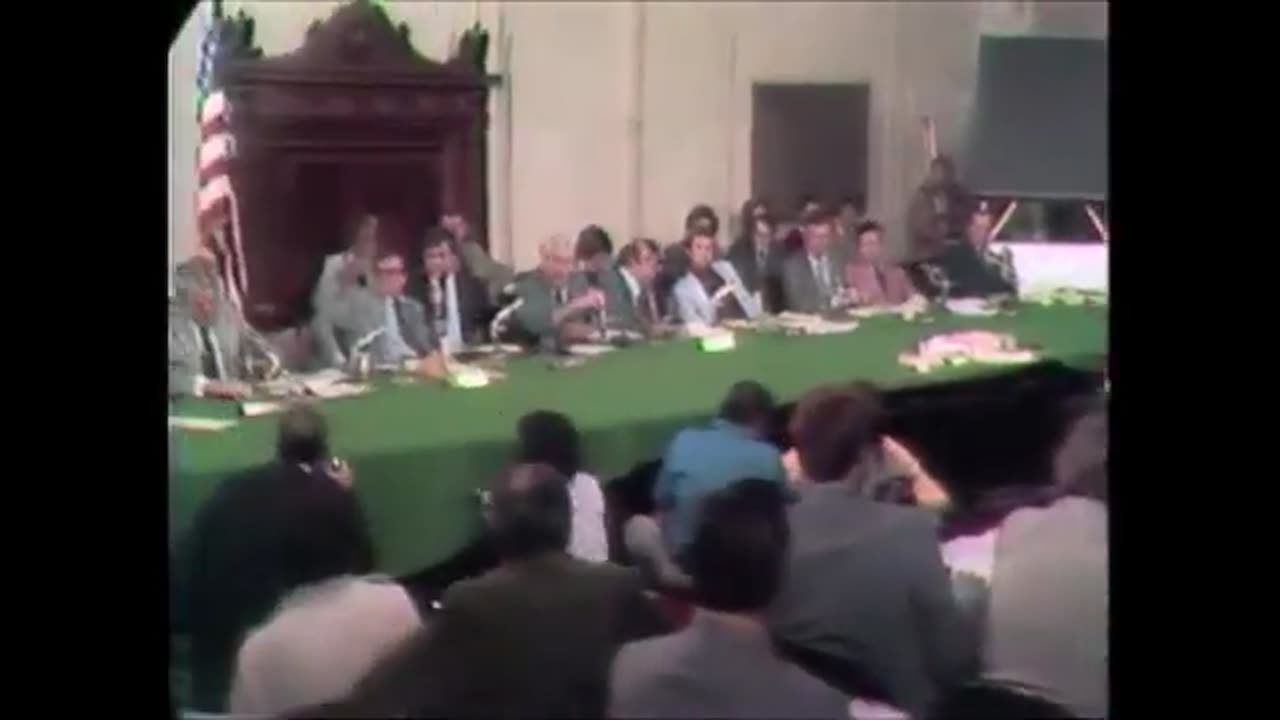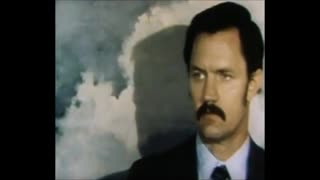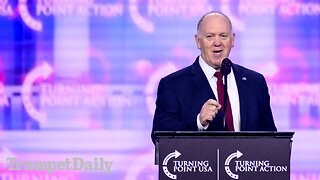Premium Only Content

Watergate Hearings Day 25: Robert Mardian and Gordon Strachan (1973-07-20)
The dark side of history: https://thememoryhole.substack.com/
Robert Charles Mardian (October 23, 1923 – July 17, 2006) was a United States Republican party official who served in the administration of Richard Nixon, and was embroiled in the Watergate scandal as one of the Watergate Seven who were indicted by a grand jury for campaign violations. His conviction for conspiracy was overturned because of procedural unfairness and he was not subsequently retried.
Family and early life
Mardian's father, Samuel, was from the Armenian town of Hadjin in the Vilayet of Adana in the Ottoman Empire (present day Saimbeyli in Mediterranean Turkey). He was born Samuel Zeligian into a Christian family and was a member of Second Congregational Church in Hadjin. Following the massacre of 35,000 Armenians in Adana in 1909 and the siege of Christian Hadjin Samuel escaped with his family and was in the United States by 1912. Samuel settled in California and supported progressive politicians such as Hiram Johnson and Franklin D. Roosevelt.
Samuel Mardian's four sons, however, adopted free-market politics. Robert Mardian's brother, Daniel Mardian Sr. founded Mardian Construction Company, a multi-million dollar concern, which contributed to Arizona's prominence and Samuel Mardian Jr. joined him as the vice president. Samuel Mardian also served as mayor of Phoenix, Arizona from 1960 to 1964, and was a leading supporter of Barry Goldwater.
Robert Mardian went to public school in Pasadena, California followed by Columbia University, North Dakota State Teachers College, and the University of California, Santa Barbara.[1][2] While serving in the United States Navy he met and married Dorothy Denniss in 1946. They had three sons. Mardian was awarded a law degree from the University of Southern California in 1949. After leaving law school he went into private practice as a corporate lawyer.
Politics
In 1956, Mardian, already active in the Republican Party, was appointed to a vacant seat on the Pasadena School Board. He was elected in 1957 but resigned shortly afterwards through pressure of work. From 1962, Mardian left his law practice to become vice president and chief legal officer of a savings and loan association. In the 1964 presidential election he managed the Goldwater campaign in four western states; although Goldwater was unsuccessful, his campaigning ability impressed Richard Nixon and he was appointed to the same position in Nixon's 1968 campaign. This time, of the four western states, the Republicans carried all but Washington. In the intervening years, he served as chairman of Ronald Reagan's state advisory committee during his 1966 gubernatorial campaign in California.
Nixon official
His work on the 1968 campaign led to Mardian becoming close to campaign managerJohn N. Mitchell. Mardian was appointed general counsel to the Department of Health, Education and Welfare in the Nixon administration. He supported Mitchell's 'Southern strategy' and advised the Department on ways of slowing the pace of school integration. His success in this post led to a promotion to Assistant Attorney General under Mitchell.
Mardian was in charge of the Internal Security Division, which headed up the fight against the radical left, prosecuting draft dodgers. He was entrusted to transfer to the White House the wiretap logs which had been discovered among J. Edgar Hoover's possessions in the Federal Bureau of Investigation after his death.
Watergate
Watergate scandal
The Watergate complex in 2006
Events
List
People
Watergate burglars
Groups
CRP
Committee for the Re-Election of the President Fred LaRue Jeb Stuart Magruder Robert Mardian John N. Mitchell Kenneth Parkinson Hugh W. Sloan Jr. Maurice Stans
White House
Judiciary
Journalists
Intelligence community
Congress
Related
vte
Mardian became involved in the Nixon administration's unorthodox campaigns early when he headed the federal prosecution of Pentagon Papers leaker Daniel Ellsberg in 1971. Although passed over for the appointment as deputy manager of CRP, Mardian was appointed as a 'political coordinator' with an uncertain role, as well as counsel for the committee.
The offense for which Mardian was convicted, but later cleared, occurred on June 17, 1972. Mardian was with other campaign officials in California preparing for a fundraising dinner. Having learned of the arrest of the five men in the Watergate complex, Jeb Stuart Magruder testified that at John N. Mitchell's suggestion Mardian telephoned G. Gordon Liddy and told Liddy to contact Attorney General Kleindienst, with an order that James W. McCord, Jr. should be released before his identity was discovered. Liddy insisted that the call had come from Magruder. Mardian always insisted on his innocence and since the trial has said that John Dean had the idea of calling Kleindienst. Mardian stated that he could have played no role in getting the burglars released, given his location and the difference in time zones.
On June 20, Mardian and Fred LaRue met with Liddy in LaRue's apartment in the Watergate complex, where Liddy told him the full story of 'the plumbers' activities. Mardian suggested to Liddy that he was likely to be traced and ought to give himself up; he also said that Mitchell was unlikely to let CRP funds be used to bail the Cuban burglars, but the Cuban community in Florida might help.
Indictment and trial
When Jeb Stuart Magruder decided to cooperate with the prosecution on April 10, 1973, it became certain that Mardian would be indicted, although he had first to go before the Ervin Senate committee (July 19–20, 1973).[3][4] Before the Senators, Mardian was an effective witness in defense of his actions. The grand jury nonetheless indicted him on March 1, 1974.
In January 1975, Mardian was convicted on one count of conspiracy to hinder the investigation. He was sentenced to 10 months to 3 years on February 21, 1975, but on appeal in 1976 the conviction was quashed. The United States Court of Appeals for the District of Columbia Circuit held that Mardian ought to have been tried separately because his lawyer, David Bress, fell ill two weeks into the trial, and because of Mardian's limited alleged role. The special prosecutor declined to retry him; in 1997 his appeal lawyer Arnold Rochvarg wrote a book outlining the legal history of the case and arguing that Mardian was innocent.
Later years
After leaving his campaign position, Mardian moved to Phoenix, Arizona to join the family construction business. He retired in 2002 and remained in Phoenix, with a summer home in California.
Before the May 2005 revelation that W. Mark Felt was the mysterious Watergate source known as "Deep Throat," some believed that Mardian had been the informant. When Felt was revealed to have been the source, Mardian told the Arizona Republic that Felt "betrayed his position" by leaking to The Washington Post.
Mardian died of complications from lung cancer on July 17, 2006, at his vacation home in San Clemente, California.
References
Sullivan, Patricia (July 21, 2006). "Robert Mardian; Attorney Caught Up in Watergate Scandal". The Washington Post. Retrieved April 26, 2022.
Martin, Douglas (July 22, 2006). "Robert Mardian, 82, Nixon Campaign Lawyer, Dies". The New York Times. Retrieved April 26, 2022.
1973 Watergate Hearings; 1973-07-19; Part 2 of 5, retrieved 2020-06-04
1973 Watergate Hearings; 1973-07-20; Part 1 of 4, retrieved 2020-06-04
The Watergate Hearings: Break-in and Cover-up (New York Times book) (Bantam Books, Inc., New York, 1973)
Watergate: The Corruption and Fall of Richard Nixon by Fred Emery (Jonathan Cape, London, 1994)
Watergate Victory: Mardian's Appeal by Arnold Rochvarg (University Press of America, Lanham, Maryland, 1995)
External links
U.S. Department Health and Human Services Bio of Robert C. Mardian
[1]
"Robert Mardian, One of the Watergate Seven – Obituary – The Independent www.independent.co.uk. Retrieved 2010-02-25.
Footage of Robert Mardian testifying before the Senate Watergate committee in the American Archive of Public Broadcasting: 7/19/1973, 7/20/1973
Authority control databases Edit this at Wikidata
Categories:
1923 births2006 deathsPoliticians from Pasadena, CaliforniaPoliticians from Phoenix, ArizonaAmerican people of Armenian descentColumbia University alumniUSC Gould School of Law alumniDeaths from lung cancer in CaliforniaUnited States Assistant Attorneys GeneralUniversity of California, Santa Barbara alumniCalifornia RepublicansArizona RepublicansSchool board members in CaliforniaPeople convicted in the Watergate scandalUnited States Navy personnel of World War II
Gordon Creighton Strachan (born July 24, 1943) is an American attorney and political staffer who served as an aide to H.R. Haldeman, the chief of staff for President Richard Nixon and a figure in the Watergate scandal.
Early life and education
Strachan was born in Berkeley, California.[1] At University of Southern California, he was a member of Trojans for Representative Government with future Watergate scandal participants Dwight L. Chapin, Tim Elbourne, Donald Segretti, Herbert Porter, and Ron Ziegler. In 1965, he received a Bachelor of Arts degree in international relations from the University of Southern California.[citation needed] In 1968, received a Juris Doctor from the UC Berkeley School of Law.[citation needed]
Career
From 1968 until 1970 he worked for the New York City law firm of Mudge, Rose, Guthrie & Alexander, the same firm Nixon worked for before he ran again for the presidency in 1968.
Strachan (right) and Richard Nixon (left) in the Oval Office, circa 1971 during Nixon's Presidency
Strachan, who was recruited by Dwight Chapin, joined the White House Office in 1970 and initially worked as a staff assistant to Herbert G. Klein. He was assigned to be H. R. Haldeman's liaison to the Committee for the Re-Election of the President (CRP) when it was formed in March 1971. His duties at CRP focused on areas that he had previous experience with; as an advance man during 1970 mid-term election campaigns, he oversaw political operations. He testified as such before the United States Senate Watergate Committee and stated that John Dean oversaw all political intelligence-gathering, including the Watergate break-in, at CRP.
Strachan was indicted along with other White House staffers on March 1, 1974, but all charges against him were dropped on June 10, 1975.
He moved to Utah in 1975, and served as a clerk for Berman & Giauque in Salt Lake City. In 1977 his license to practice law was restored in Utah, and he was elevated to a lawyer at the firm, until he left for a partnership at Prince, Yeates & Geldzahler. He was a principal at the law firm, Strachan Strachan & Simon P.C., in Park City, Utah, but is now retired. His practice mainly focused on antitrust, personal injury and business litigation in the recreational sports industry. He served on the Olympic Organizing Committee for the 2002 Winter Games, and is also general counsel to the United States Ski and Snowboard Association.[citation needed] He is the author of several articles on law.
Sources
"Special Files: Gordon C. Strachan". Nixon Presidential Materials. Archived from the original on April 14, 2005. Retrieved March 7, 2005.
"Firm History". Strachan & Strachan P.C. Archived from the original on February 7, 2005. Retrieved March 7, 2005.
John Ehrlichman: In the Eye of the Storm, Hosted by Tom Clancy (1997) Video. ISBN 0-9665154-0-4
References
The Martindale-Hubbell Law Directory. Martindale-Hubbell Law Directory, Incorporated. 1999. ISBN 978-1-56160-324-4.
External links
Strachan Strachan & Simon P.C. Website
-
 55:35
55:35
The Memory Hole
24 days agoJohn Stockwell Reveals Shocking CIA Secrets in 'In Search of Enemies' (1978)
6183 -
 1:05:22
1:05:22
Donald Trump Jr.
15 hours agoAmerica First Means Reviving the American Dream, Interview with Peter Schweizer | TRIGGERED Ep.203
174K295 -
 1:34:02
1:34:02
The Officer Tatum
14 hours agoLIVE: Trump ENDORSES Mike Johnson as Elon BACKTRACKS On H-1B + MORE | Officer Tatum Show EP 32
103K190 -
 45:56
45:56
Kimberly Guilfoyle
14 hours agoNew Year. Same MAGA Mission, Live with Roger Stone | Ep. 183
113K45 -
 1:49:14
1:49:14
2 MIKES LIVE
18 hours ago2 MIKES LIVE #160 We're Back! Deep Dive Monday!
95.3K22 -
 54:28
54:28
LFA TV
1 day agoTrump’s Triumphant Year | Trumpet Daily 12.30.24 7PM EST
85.5K14 -
 2:28:37
2:28:37
Quite Frankly
17 hours ago"2024 Review, Homunculus Flu, Old/New Year Predictions" 12/30/24
106K16 -
 14:04:17
14:04:17
RonjnJeremy
19 hours ago $9.49 earnedClassic Wow 20th Anniversary edition HC SF, Rogue..PT8 lvl 46+ Just need to stay alive...
123K6 -
 1:50:28
1:50:28
Jesús Enrique Rosas
16 hours agoEp. 51: Gates wants CENSORSHIP, Colbert MESSES UP, AOC meltdown, Hanks LEAVING and MOAR!
132K96 -
 1:45:47
1:45:47
The Quartering
18 hours agoHuge Censorship Law To Pass, Trump Endorses Johnson, TikTok is Saved? & Today's News!
154K85